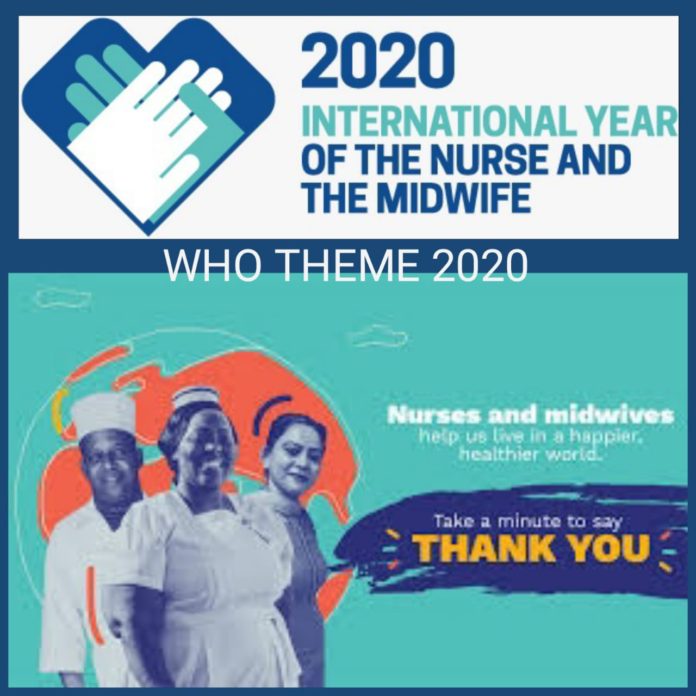*Dr. Varun J. Wani, **Dr. Priya H. Manihar
April 7 of each year marks the celebration of World Health Day. From its inception at the first Health Assembly in 1948 and since taking effect in 1950, the celebration has aimed to create awareness of a specific health theme to highlight a priority area of concern for the World Health Organization (WHO).
Themes of WHO in the previous decade:
- 2019: Universal Coverage. Everyone, Everywhere2018: Universal Coverage. Everyone, Everywhere
- 2017: Depression – Let’s Talk
- 2016: Beat Diabetes
- 2015: Food Safety
- 2014: Small Bite Big Threat (Vector-borne diseases)
- 2013: Healthy Heartbeat, Healthy Blood Pressure (Hypertension – Silent Killer)
- 2012: Good health adds Life to years (Ageing and Health)
- 2011: Antimicrobial resistance: No action today, no cure tomorrow
The theme for World Health Day 2020 is “to support nurses and midwives”. WHO has announced that 2020 will be the “Year of the Nurse” honouring the 200th birth anniversary of Florence Nightingale – thus keeping the theme to recognize the contribution of the nurses and midwives in making the world a healthier place.
Who is a midwife?
A midwife is a health professional who cares for mothers and newborns around childbirth, a specialization known as midwifery.
Who is called a nurse?
Nursing encompasses autonomous and collaborative care of individuals of all ages, families, groups, and communities, sick or well and in all settings. It includes the promotion of health, the prevention of illness, and the care of ill, disabled, and dying people [1].
The theme of the year 2020 can boost the healthcare system in the following ways:
- Facilitate investment in massive acceleration of nursing education
- Create at least 6 million new nursing jobs by 2030, primarily in low- and middle-income countries.
- Equitable distribution of nurses across the world
- Strengthen nurse leadership – ensuring that the nurses have an influential role in health policy formulation and decision making
Role of Nurses in the Community, and Obstetrics and Gynaecology
Nurses are critical to delivering on the promise of “leaving no one behind” and the global effort to achieve the Sustainable Development Goals (SDG).
They make a central contribution to national global targets related to a range of health priorities, including universal health coverage, mental health, non-communicable diseases, emergency preparedness and response, patient safety, delivery of integrated and people-centered care [2]. Not only do nurses provide treatment to the patients, but they also offer education to the community members about maintaining their health so that they can prevent various infectious and sexually transmitted diseases and deaths. They also provide health screening at community events and give advice on the importance of diet, exercise, immunization, and hand-washing techniques.
Nurses also assist the doctors while examining the patients and doing medical procedures, cleaning, and dressing wounds, setting up IV drips, and monitoring the basic care including a check of blood pressure and pulse.
Role of Midwives in Community
- Provide basic healthcare at community level
- Assist during pregnancy, delivery, and lactation in remote, rural and far-flung areas of the country
- Helping parents to cope with miscarriage, termination, stillbirth and neonatal death
- Carrying out screening tests
- Midwives play a pivotal role in reducing the depression centred on the women’s unwillingness or inability to disclose their feelings and difficulties to partners, family, friends or health professionals [3].
Role of Nurses and Midwives During COVID‐19 Pandemic
In the battle to control the ongoing COVID-19 pandemic, nurses and other health workers have proven to be the frontline warriors. We see reports that nurses in many parts of the world are grappling with shortages of much‐needed supplies including personal protective equipments such as masks, gloves, and gowns, yet are actively embracing the challenges presented by COVID‐19.
Nurses and midwives have the knowledge and skills to deliver the care needed in all phases of the illness trajectory, and in reassuring, informing, and supporting people within communities who are frightened, worried, and wanting to stay well.
At Urban Health Centres
Urban Health Centres are one of the first points of contact for patients with the healthcare system. The nurses here conduct health education sessions on a regular basis, creating awareness on the importance of social distancing. Hand hygiene, including the steps of proper hand-washing and important times to do so are demonstrated and explained. Dispensing drugs as per prescription also comes under the responsibilities of the nurses.
At Kasturba Hospital (a COVID-19 Treatment Centre)
Kasturba hospital, located at Chinchpokli, Mumbai, is one of the designated COVID-19 treatment centres. The nurses as well as the doctors were given training for preparedness to handle this disease. From taking the temperature in the screening OPD to filling out forms to administering IV drugs to admitted patients and monitoring vitals, nurses have skilfully managed multiple essential cogs in the care of COVID-19 patients. Judicious use of N-95 masks and personal protective equipment has been a key factor during the handling of potentially positive patients, both at the beginning as well as the ongoing period where there is an acute shortage of the same.
The world has been spinning under numerous health issues in 2020, due to the onslaught of Corona. Seeing the innumerable ways in which nurses hold the healthcare system together,
Support Nurses and Midwives has turned out to be a timely and apt choice of theme. We as health care providers have to work hand in hand with them to optimize health care delivery to the population.
References
- https://www.who.int/topics/nursing/en/ accessed on 28/04/2020 11.20 pm
- https://www.who.int/news-room/campaigns/world-health-day/world-health-day-2020 accessed on 28/04/2020 11.20 pm
- Jackson D, Bradbury‐Jones C, Baptiste D, Gelling L, Morin K, Neville S, Smith GD. Life in the pandemic: some reflections on nursing in the context of COVID‐19. Journal of Clinical Nursing. 2020 Mar 25.
The writers are junior residents in Community Medicine, TNMC & BYL Nair Hospital, Mumbai, and at the time of writing this article, were posted on rotation duties at Kasturba Hospital, Mumbai and Urban Health Centre, Mankhurd. Correspondence: priyamanihar01@gmail.com


























